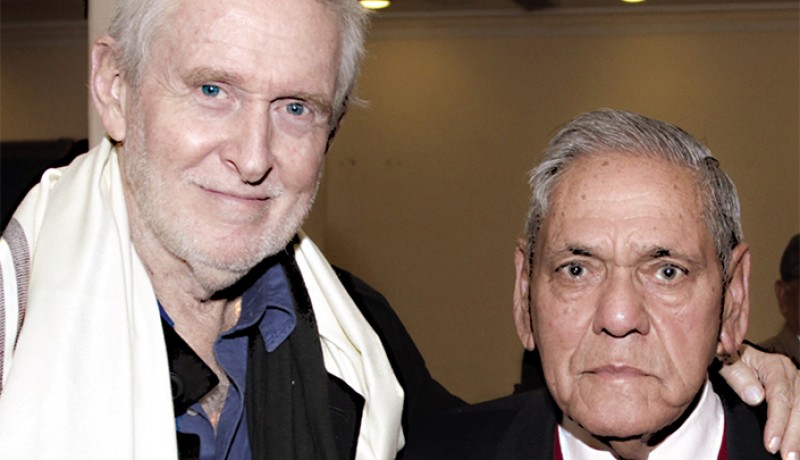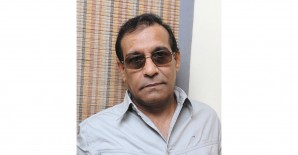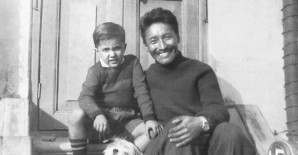
Columns

Indian cinema’s ‘blue-eyed sahib’ and cricket aficionado Tom Alter is a true gentleman who lives by his code of honour, writes Raj Kanwar.
Even though we had known each other by reputation for many years, it was just over three years ago that I first met veteran actor Tom Alter face-to-face. It was at the Rajpur Festival; the venue was the Christian Retreat and Study Centre that had been founded by Tom’s father Reverend James Payne Alter way back in the 1950s. I was just a member of the audience, and Tom the chief guest. During intermission, I went up to the dais to say hello to him. I formally introduced myself, to which he said convivially, “Of course, I know you very well, Raj.” He invited me to sit on the dais. After the festival concluded, over a cup of tea we discussed various things.
I wanted to interview him for another publication, but it so happened that his calendar during the following few months was cluttered with important and not-so-important engagements. A flurry of emails was exchanged between us but like Rudyard Kipling’s East and West, we the twain could not meet. That interview remained stillborn.
My next meeting with Tom came in December 2014 when he came to Dehra Dun to receive the Pride of Uttarakhand award from the Doon Citizens Council that was founded by me way back in the 1990s. It was an evening well spent with Tom and other recipients of various awards. Again, the long-awaited interview could not materialise since we both were too tired, he after a long and circuitous flight from Pune to Dehra Dun via Mumbai and Delhi and I as the principal organiser.
Today, Tom enjoys a remarkable virtuosity on the big and small screen as well as the theatre. His artistry extends to cricket and writing as well, making him versatile. In a telephonic interview from Mumbai, he speaks about his unfulfilled ambitions. Quoting a well-known Urdu poet, he says, “Ahista chal zindagi, abhi kai karz chukana baki hai. Kuchh dard mitana baki hai, kuchh farz nibhana baki hai.” (The poet urges ‘life’ to slow down a bit; he still has some debts to pay, to mitigate pain and sadness, and some more enjoined duties to be performed.) Much of our conversation is in chaste Urdu, a language Tom is comfortable with, besides English and Hindustani.
Born in Landour, Mussoorie on 22 June 1950, Tom was educated at the famed Woodstock School. He spent his early years in Rajpur, then a gateway of sorts to Mussoorie, and now a flourishing township. It was there that his American Presbyterian missionary father founded the Christian Retreat and Study Centre aka the Masihi Dhyan Kendra, in 1954. His mother Barbara, a missionary too, played an equally important role in managing the study centre. The study centre continues to flourish even today though the Alter family has no association with it any longer.
During winter vacations, Tom would descend to Rajpur to spend his holidays with his parents. It was in the midst of this idyllic and spiritual environment that Tom grew up into a sprightly young boy with inbred values that are still the hallmark of his persona. It was here that he had his baptism in cricket, which was to become a lifelong passion. His father’s secretary, Jwala Prasad Mandraili, was his coach.
Even today, six decades later, Tom nostalgically recalls his days as a carefree youngster in Rajpur. “Our dwelling stood right in the midst of thick and dense forests; one could see greenery as far away as one’s vision would travel. Rajpur was virtually a heaven on earth. Alas, today it has turned into a grotesque jungle of concrete.” I detect a soulful tinge in his voice even at 1,350 air kilometres away from Mumbai.
From Mussoorie and Rajpur to Yale University was altogether a different world. But a young Tom took it all in his stride, soon feeling at home at the famed American university. He became a prominent member of the university cricket team, fortifying his cricketing skills. On his return to India, Tom found a job at St Thomas School in Jagadhri—now in Haryana—as a Grade 4 teacher. His cricketing ability came in handy, with Tom being given the additional task of cricket coaching.
His passion soon led to Tom writing crisp columns on cricket for nearly a decade-and-a-half in mainstream newspapers and popular magazines. His book Best in the World (1999), co-authored with sports journalist Ayaz Memon, is the fascinating story of 10 of the greatest World Cup matches. Tom has also had the distinction of possibly being the first journalist to interview cricket icon Sachin Tendulkar on TV, when he was just 15 years old. Incidentally, Tom’s son Jamie Alter has outscored his father as far as cricket writing is concerned. His book, The History of World Cup Cricket 1975-2011, with a foreword by Harsha Bhogle, has attained an iconic niche in cricket literature. While Jamie is currently with The Times of India, Tom’s daughter Afshaan is married to Kevin, a red-blooded American, and lives in Boston.
How the movie bug bit a teenage Tom is a fascinating story. Sometime in 1969, as Tom watched Rajesh Khanna romance Sharmila Tagore in Aradhana, he was instantly infatuated with the debonair hero. “I still dream of being a Rajesh Khanna,” Tom tells me. “For me, in the early 1970s, he was the only hero, romantic to the core, so real and so very Indian. He was the reason I came into films.” In June 1972, he joined the prestigious FTII in Pune. Naseeruddin Shah, Shabana Azmi, Mithun Chakraborty and Benjamin Gilani were his college mates.
He entered the film industry with Chetan Anand’s Saheb Bahadur and Ramanand Sagar’s Charas. Thereafter, he worked with reputed directors like V Shantaram, Raj Kapoor, Hrishikesh Mukherjee, Manmohan Desai, Manoj Kumar, Satyajit Ray and others. Though he got the opportunity to act with the top stars of the day, his cherished wish to act with Rajesh Khanna remained unfulfilled. He also acted in a Hollywood film, One Night with the King, with Peter O’Toole as his co-star.
TV, too, provided him a large enough canvas to amply showcase his acting prowess. In Junoon, which ran for five years, he played the memorable role of a sadistic mobster, Keshav Kalsi. Tom has been equally, if not more, active in theatre. Way back in 1979, along with Naseeruddin Shah and Benjamin Gilani, he launched a theatrical company, Motley Productions, which debuted at Mumbai’s famed Prithvi Theatre with Samuel Beckett’s Waiting for Godot. Prithvi Theatre has since then been Tom’s theatrical karmabhoomi. He also played Sahir Ludhianvi in a bio-play based on the life of the great Urdu poet and lyricist, a performance that evoked much appreciation. One of his most memorable roles was in the theatrical presentation of William Dalrymple’s City of Djinns, where his fellow artists were Zohra Sehgal and Manish Joshi Bismil.
Past 66, Tom is not inclined to call it a day as yet. “The woods are lovely, dark and deep, but I have promises to keep, and miles to go before I sleep,” he quotes American poet Robert Frost. Tom says he wants to produce and direct movies to be shot entirely in the twin cities of Dehra Dun and Mussoorie. “I may possibly base my first movie on my novel Rerun at Rialto, published in 2001, here. As I have already directed plays, directing films should be a seamless transition,” he says with a degree of self-assurance.
Tom doesn’t follow the herd and lives life in his own way. “I believe in doing what I like or what I fancy without caring about the world,” he says. He wears his simplicity effortlessly. He is polite and courteous to a fault; I have never heard him address any one as tu; it is aap that comes naturally to him. Tom is truly a man of action. More important, he has his code of honour, and lives by that.
The writer is a veteran journalist based in Dehradun
Photo: Bhumesh Bharti Featured in Harmony — Celebrate Age Magazine January 2017
you may also like to read
-
Mental workout
Mukul Sharma tells you how to keep those grey cells ticking Everyone will ultimately lose his or her brain….
-
Helpline
Dr Harshbir Rana answers your queries on personal and social issues related to ageing, elder care and intergenerational relationships ….
-
Off the cuff
Raju Mukherji pays tribute to his first hero, Tenzing Norgay, an exemplary mountaineer Darjeeling, 1955. Dr ‘Pahari’ Guha Mazumdar….
-
Yoga RX
Shameem Akthar shows ways to control debilitating ankle pain through regular practice Ankle pain is so common and prevalent….







